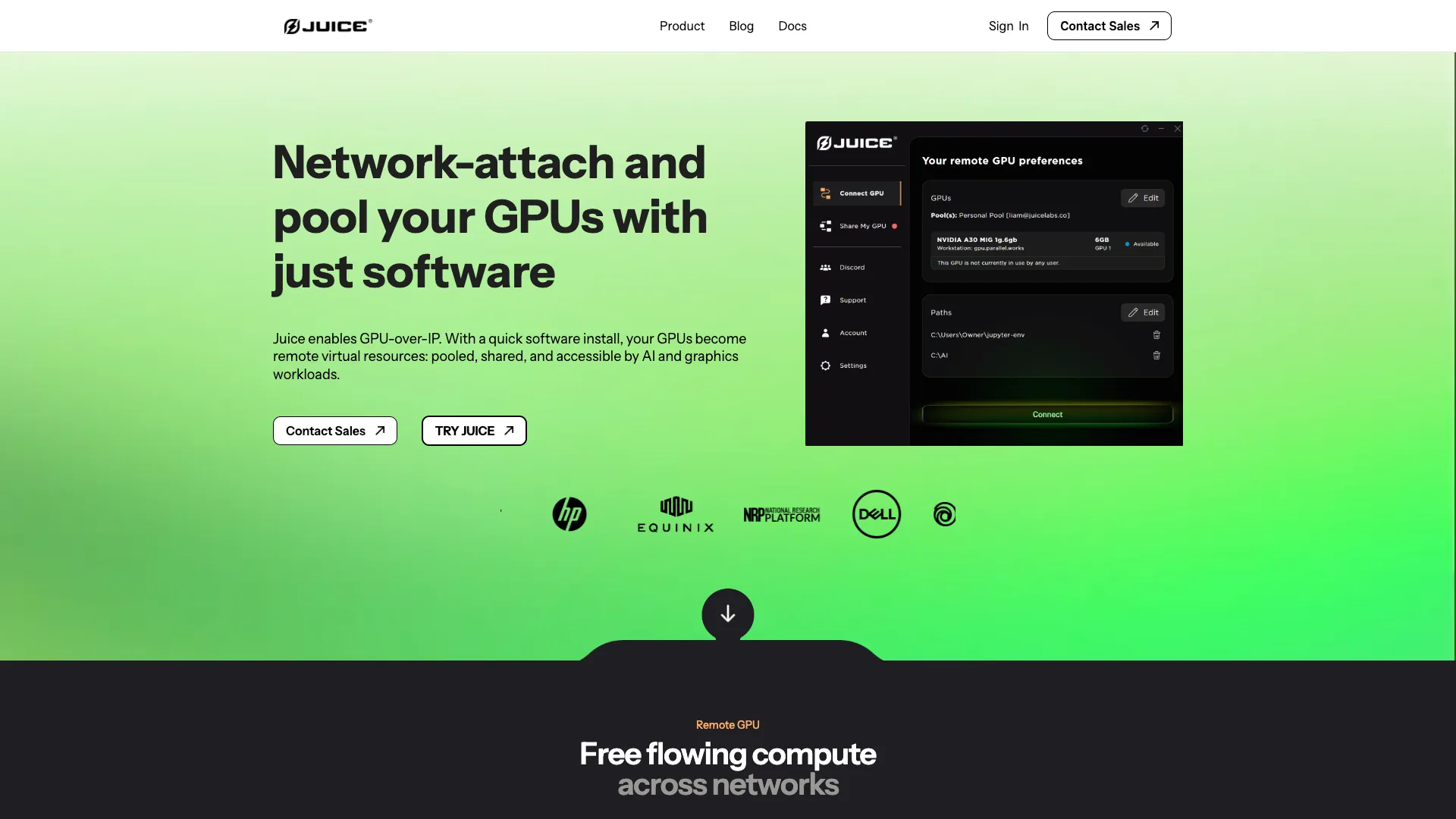Gpu Resource Optimization Tool

What is juicelabs.co?
Juice Labs specializes in GPU access and sharing solutions. Their flagship product, Juice Remote GPU, facilitates the execution of AI and graphics workloads on remote GPUs through several key features:
Dynamic Sharing: Allows a single GPU to be shared across multiple workstations or dynamically allocated to CPU-only machines, such as serverless functions.
No Code Changes: Applications utilizing CUDA or Vulkan APIs can leverage remote GPU processing via Juice’s agent without the need for modifying existing code.
Performance: Demonstrates performance levels comparable to local GPUs, with performance within 5% when operating in the same data center.
Compatibility: Supports a wide range of APIs including CUDA, Vulkan, DirectX, and OpenGL. It is also compatible with popular AI frameworks like PyTorch and TensorFlow.
For those interested in GPU-over-IP solutions, Juice Labs presents a compelling option worth exploring further.
What are the benefits of juicelabs.co?
Juice Labs offers several key benefits through their Juice Remote GPU solution:
Flexible GPU Sharing: Allows dynamic sharing of a single GPU across multiple workstations or dynamically allocates GPUs to CPU-only machines, optimizing GPU utilization.
No Code Changes: Applications utilizing APIs like CUDA, Vulkan, DirectX, and OpenGL can offload GPU processing to a remote host seamlessly, without requiring any modifications to existing code.
Performance: Achieves performance levels within 5% of a local GPU when both are situated in the same data center, ensuring efficient execution of AI and graphics workloads.
Convenient Access: Provides remote access to GPUs, catering well to distributed teams and cloud-based workloads.
For specific pricing details or further inquiries, it is recommended to contact Juice Labs directly.
What are the security features of Juice Remote GPU of juicelabs.co?
Juice Remote GPU emphasizes security with several key features:
Authentication and Authorization: Users must authenticate to access GPUs, with authorization mechanisms ensuring control over resource access.
Encryption: Data transmitted between clients and remote GPUs is encrypted using robust protocols like TLS/SSL, ensuring secure communication.
Isolation: Each user sharing the same GPU operates within a separate environment, maintaining isolation and privacy of workloads.
Audit Trails: Detailed logs track GPU usage, enabling monitoring and investigation of security incidents effectively.
Firewall Rules: Utilizes firewall rules to restrict access to GPU servers, adding an additional layer of security.
As security practices evolve, it is advisable to refer to Juice Labs' documentation for the most current information on their security measures.
How does juicelabs.co handle data privacy?
Juice Labs places a strong emphasis on data privacy to ensure secure GPU access. Here are the key aspects of their approach:
User Authentication: Users are required to authenticate themselves before accessing GPUs, ensuring that only authorized individuals can utilize the service.
Encryption: All data transmitted between clients and remote GPUs is encrypted using secure protocols such as TLS/SSL. This encryption prevents unauthorized access and protects against eavesdropping.
Isolation: Juice Labs maintains strict isolation between users sharing the same GPU. Each user's workload operates within a separate environment, preventing any interference or access to others' data.
Audit Trails: Detailed logs are maintained to track GPU usage comprehensively. These logs facilitate ongoing monitoring and provide essential data for investigating any potential security incidents.
Firewall Rules: Firewall rules are implemented to control and restrict access to GPU servers, further bolstering the overall security posture.
For the most current and detailed information regarding Juice Labs' privacy practices, it is recommended to consult their official documentation.
What are the limitations of juicelabs.co?
While Juice Labs offers robust GPU-sharing solutions, it's important to consider several limitations:
Latency: Remote GPU access can introduce latency due to data transmission over the network, which may impact real-time applications.
Network Dependence: Stable internet connectivity is crucial for consistent GPU access and performance. Disruptions in network connectivity can affect usability.
Resource Contention: Sharing a GPU among multiple users can lead to resource contention. Heavy workloads from other users sharing the same GPU may affect performance.
Security Risks: Despite Juice Labs' focus on security with measures like authentication and encryption, remote access solutions inherently carry security risks. It's essential to implement and monitor security practices to mitigate these risks.
Cost: While specific pricing details may vary, GPU access services typically incur costs. Evaluate the pricing structure to determine if it aligns with your budget and usage requirements.
To determine if Juice Labs' offerings align with your needs, further exploration and assessment are recommended. Evaluate how well their solutions address your specific requirements, including considerations around latency, network stability, resource availability, security, and budgetary constraints.
What is Juice Labs and its primary function?
Juice Labs is a cutting-edge computing platform focused on providing remote GPU access over standard networking. Its primary function is to facilitate seamless and flexible execution of graphics and AI workloads by allowing any application host to tap into GPUs from anywhere. This is achieved without requiring changes to existing applications or hardware, making Juice Labs a convenient solution for enterprises and organizations needing scalable GPU resources.
How does Juice Labs enable dynamic GPU allocation?
Juice Labs employs dynamic sharing and pooling software that allows workload-specific GPU access on demand. This means users can access GPU capacity instantly when needed, adapting and re-balancing compute resources dynamically across networks. This capability is particularly beneficial for organizations looking to optimize GPU utilization, manage cross-cloud demands, or transform CPU-only nodes into GPU nodes without delay or hardware modifications.
Who can benefit from using Juice Labs' services?
Juice Labs' services cater to global enterprises, universities, digital infrastructure companies, and workstation manufacturers primarily engaged in AI and graphics processing. Enterprises can benefit by pooling and sharing GPU capacity across teams or departments, while educational institutions can leverage the platform for tasks like dynamic GPU scheduling and pooling in superclusters. Additionally, digital infrastructure companies can route GPU capacity effectively, and manufacturers can provide data scientists with dynamic resources for AI workloads, enhancing productivity and operational flexibility.
































